Thailand's crackdown on 'wombs for rent'
- Published
Baby Gammy is now settled in a provincial Thai town, as Jonathan Head reports
When a surrogate baby scandal erupted in Thailand last year, many in the country did not know what to expect next.
First there was the young boy, apparently abandoned by the Australian couple who had commissioned a Thai surrogate mother to carry him.
The boy had Down's syndrome, but the couple had taken his twin sister back to Australia with them.
Then there were the 12 babies found living in a single apartment with nannies, all fathered by the same, mysterious young Japanese man.
Many more babies had already been spirited out of Thailand.
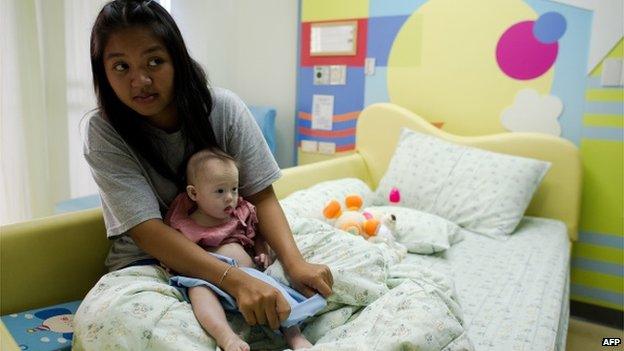
Ms Chanbua holding baby Gammy
Today the Australian boy - named Gammy - lives with the woman who was paid to give birth to him, seemingly a loved member of his adopted family.
"I don't regret anything about the surrogacy", Pattaramon Chanbua told me. "I don't blame anyone. To me, Gammy is a blessing."
To help her cope with the strikingly fair-skinned little boy, an Australian charity has bought her a bigger house, and gives her a modest monthly allowance. Gammy has also been given Australian citizenship.
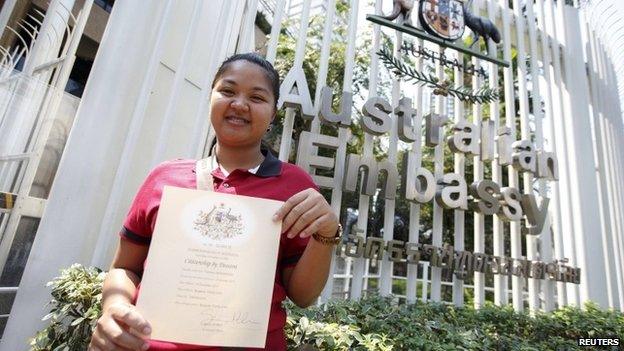
Gammy was given Australian citizenship
Mitsutoki Shigeta, the mystery Japanese man, is still fighting to get custody of the 12 babies he sired through various Thai surrogates.
They are being kept in a state children's shelter. Last month a court awarded him custody of three, despite strong concern over his motives for wanting so many babies.
'I'd do it again'
Now, five years after it was first drafted, the Thai parliament has passed a law which it hopes will shut down the "wombs-for-rent" business for good.
Foreigners are banned from seeking surrogates in Thailand. Thai couples can find surrogate parents, but not through agents, or on any kind of commercial basis.
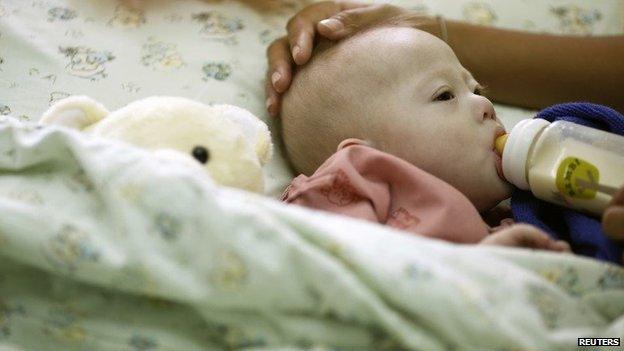
Gammy was born with Down's syndrome, a congenital heart condition and a lung infection
At the heart of the business are hard-up Thai women, who see nine months carrying someone else's child as a relatively easy way to make good money.
Pattaramon was one, although she says she would never do it again.
Daeng, a factory worker living outside Bangkok, is another. A single mother in her thirties, she agreed to carry twins for Mr Shigeta.
When the time came to hand them over, she admitted it was hard.
"I carried them for nine months, and I loved them," she said. But she went through with the contract, and "would do it again - so would anybody - because of the money".
Daeng says she was paid the equivalent of 10 years' salary.
Other women have had unhappier surrogacy experiences.
Four years ago, 15 Vietnamese women were found in a Bangkok apartment, seven of them pregnant.
Some of them said they had been lured there with the promise of well-paid jobs; two said they had been raped.
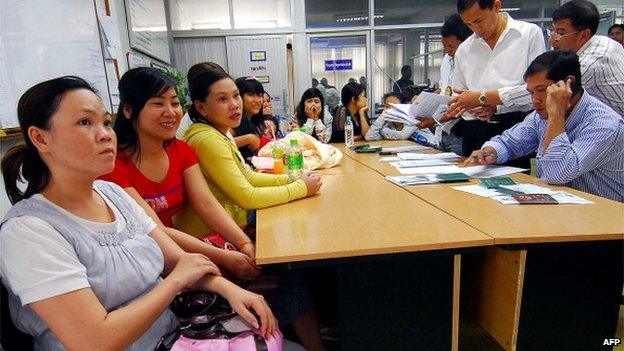
A group of 15 Vietnamese women said they were lured into becoming surrogate mothers
A Taiwanese company called Babe-101 was accused by anti-trafficking groups of being behind the operation, but the police never pressed charges, and the doctor who supervised the conceptions and the births is still practising at a well-known Bangkok hospital.
Like much of Thailand's medical industry, the surrogacy business is profit-driven and poorly regulated.
For childless couples, desperate for a family, this has meant quick and low-cost surrogacies, without too much red tape. Most would probably want the best possible treatment for the carrier of their children. But it does not always work out that way.
At a women's shelter on the outskirts of Bangkok, I watched three figures, masked by balaclavas, nervously telling their story to journalists.
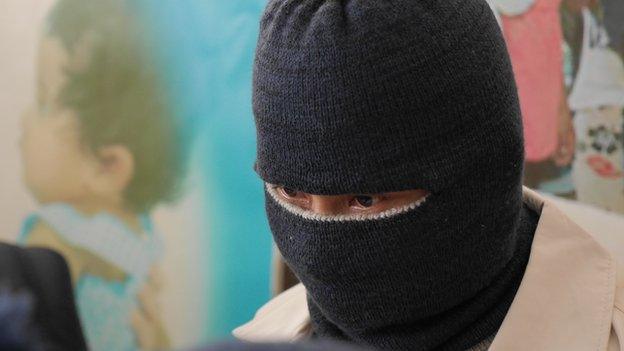
One of the women who told journalists about their experiences with surrogacy
One of them was Namphun - not her real name. Her husband was with her. Until that week, he had believed the baby she was carrying was his.
But then, she said, he had been threatened by police officers, who insisted his wife had signed a contract to carry a baby for a Chinese man, and that she had to travel overseas for the birth.
They both fled to seek refuge in the shelter, along with another pregnant surrogate.
Namphun said she was terrified of the agent, who she said had also been putting pressure on her to leave Thailand before the expected crackdown on surrogates.
She had decided she no longer wanted to go through with the deal - she would keep the baby, no matter that she had no genetic connection to it. "If they stop chasing me, after the birth I will love it, and take care of it."
She showed me the contract. Surprisingly, the address of the company she was dealing with, IVF Sunrise, was in London. Its website shows an office in Bangkok, but when I visited last September, there was no sign of it, nor had anyone in the building heard of it.
IVF Sunrise is listed as a limited liability partnership, with a correspondence address in Percy Street, London, but its partners are entities based in Belize and the Seychelles.
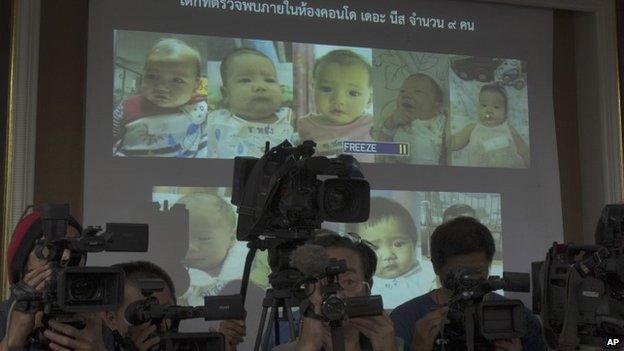
Thai officials have tightened up surrogacy regulations following worldwide attention
A staff member responded to a BBC email by stating that the company now operates in Nepal, but has been out of Thailand since last September. The response did not address questions about how Namphun was treated.
The surrogate business in Thailand has often been a shadowy, unaccountable one. Now the practice has been more or less outlawed, there are justified fears that, with so much money on offer, it will simply be driven underground.
"We have no law enforcement", admits Dr Somsak Lolekha of the Thai Medical Council. "Just like drinking and driving. We have the law. But they never enforce it.
"That is a weak point of Thailand."
- Published6 August 2014
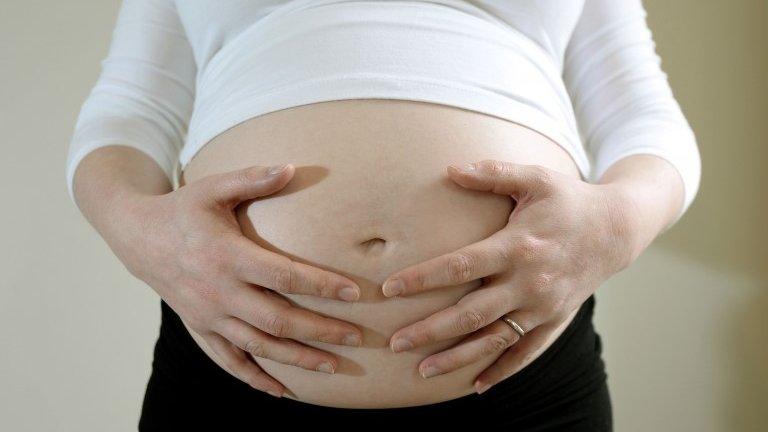
- Published1 October 2013
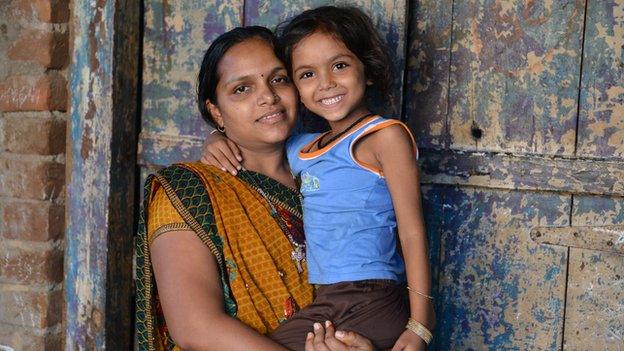
- Published28 July 2011